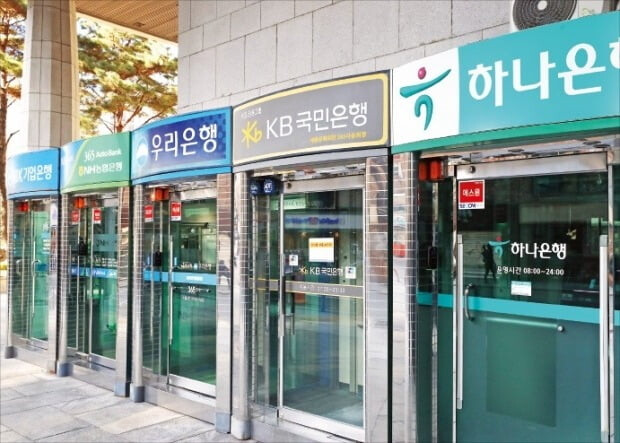
The rapid digitalization of finance and the rise of non-face-to-face interactions due to the COVID-19 pandemic have led to a significant decline in the number of bank branches in South Korea. This trend is raising concerns about the increasing financial exclusion of individuals who rely on offline banking services, particularly the elderly and those residing in rural areas. While the Korea Financial Industry Union (KFIU) has proposed preventing the arbitrary closure of bank branches as a key policy demand for the upcoming presidential election, relevant legislative discussions have yet to commence in earnest. In response, financial authorities are planning to introduce a "bank agency system" that would allow non-bank entities, such as post offices, to offer basic banking services.
According to data released by the Financial Supervisory Service (FSS) on April 25th, the number of bank branches in South Korea has steadily decreased from 6,738 at the end of 2019 to 6,427 at the end of 2020, 6,121 at the end of 2021, 5,831 at the end of 2022, 5,747 at the end of 2023, and further down to 5,690 by the end of October 2024. This represents a reduction of over 1,000 bank branches in just five years. Notably, the decline has been more pronounced in non-metropolitan small and medium-sized cities and rural areas with high aging populations, exacerbating the potential for financial exclusion among digitally vulnerable demographics, especially senior citizens.
A study by the Korea Institute of Finance (KIF) titled "Analysis and Implications of Domestic Bank Branch Distribution" revealed that among the 30 regions where consumers need to travel more than 20 kilometers to access a bank branch, 26 of them are classified as super-aged societies, with over 20% of their population aged 65 or older. This geographical disparity in access to banking services underscores the growing challenges faced by elderly individuals in managing their finances.
Recognizing this issue, the political sphere has also taken note, with lawmakers proposing legislation aimed at protecting financial consumers by imposing stricter regulations on bank branch closures. Park Hong-bae, a member of the Democratic Party of Korea, has proposed an amendment to the Banking Act that would require banks to obtain approval from the Financial Services Commission (FSC) before closing a branch. According to the proposed amendment, banks would be obligated to notify the FSC of their intention to close a branch at least six months prior to the closure date. The FSC would then review the notification and could reject the closure if it deems that it does not adequately protect the interests of branch users.
The KFIU has also made the reinforcement of bank branch closure procedures a key policy demand for the upcoming presidential election. The labor union argues that commercial banks with nationwide networks should maintain at least one branch in each local government unit and opposes any further reduction in the current number of branches in principle. The KFIU emphasizes the need to legally mandate a prior evaluation process to prevent arbitrary branch closures.
Despite these concerns and proposed legislative measures, discussions on the relevant bills have made little progress. A primary concern raised by financial authorities and the banking industry is the potential for excessive infringement on banks' managerial autonomy. The FSC has stated that decisions regarding the closure of bank branches are management judgments that should be made based on a comprehensive consideration of profitability and competitiveness, cautioning against allowing the FSC to directly approve or reject such decisions. The Korea Federation of Banks (KFB) has echoed this sentiment, expressing concerns that increased regulations could hinder banks' ability to respond to rapidly changing business conditions, such as the expansion of digital finance, thereby weakening the competitiveness of the banking industry.
In response to the shrinking physical branch network and the potential for financial exclusion, financial authorities are planning to introduce a "bank agency system" in the latter half of 2025. This system will allow third-party entities, such as jointly established common branches by multiple banks or post offices, to perform banking services that are typically exclusive to banks, including accepting deposits and withdrawals, processing loans, and facilitating fund transfers.
Furthermore, it has been reported that financial authorities are also planning to revise the joint procedures for bank branch closures. An official from the financial authorities stated that they are "reviewing various measures to minimize the inconvenience and damage to financial consumers resulting from bank branch closures." These measures are expected to complement the introduction of the bank agency system in mitigating the negative impacts of branch closures on vulnerable populations and ensuring continued access to essential financial services. The implementation of the bank agency system and the potential revisions to branch closure procedures signal a growing recognition by financial authorities of the need to balance the efficiency gains of digitalization with the imperative of maintaining financial inclusion for all segments of society. The coming months will be crucial in determining the specific shape and effectiveness of these measures in addressing the challenges posed by the ongoing transformation of the banking landscape in South Korea.
[Copyright (c) Global Economic Times. All Rights Reserved.]






























